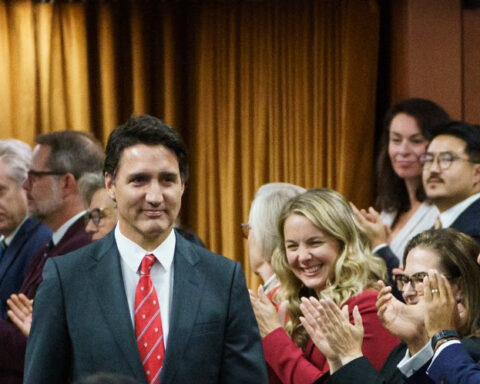On International Women’s Day, equal rights experts say that cabinet gender equality, a prime minister who calls himself a feminist and social media campaigns such as #HeForShe help in the fight for women’s rights in Canada and internationally, but that there is still a long way to go toward policy parity that translates into real progress.
In interviews with iPolitics, the heads of the United Nations Population Fund and Action Canada for Sexual Health and Rights say that while there’s greater awareness around issues of gender inequality than in the past, that still needs to translate into concrete action to improve the lives of women in Canada and abroad on issues like access to education, career opportunities and sexual and reproductive rights.
“It’s not just about wearing a badge and saying ‘He For She,’” said Babatunde Osotimehin, executive director of the UN Population Fund (UNFPA) in reference to the viral social media movement spearheaded by UN Women and actress Emma Watson over the past two years.”We have to do things — what are we doing at home and in the workplace environment to make sure that women are treated equally? We need to keep pushing.”
Time to stop ‘skirting around’ the issue
Since the election of Prime Minister Justin Trudeau and his gender-balanced federal cabinet, there’s been renewed attention domestically on the issues of gender equality and women’s representation in politics.
“We can talk about gender equality, but until we actually start doing things and confronting things, we aren’t going to get there.”
Cabinet ministers including Environment Minister Catherine McKenna have sparked discussions over work-life balance and the challenges faced, particularly by women, by, for instance, late votes in the House. Former NDP MP Sania Hassainia, prompted debate on how to make public and work spaces more family-friendly when she brought her baby into the House of Commons during a vote in 2014.
It’s these kinds of discussions that are vital to putting the issue of gender equality on the public radar, Osotimehin says, so that leaders prioritize “creating child-friendly spaces around the world and making sure that women don’t lose their career growth.”
“We have skirted around it for too long,” he said. “We can talk about gender equality, but until we actually start doing things and confronting things, we aren’t going to get there.”
With a prime minister who calls himself a feminist, Canada is better placed than it’s been in years to lead initiatives on gender equality not just at home but abroad, says the executive director of Action Canada for Sexual Health and Rights.
Sandeep Prasad says Monday’s announcement for greater funding for sexual health education and family planning is an indication that the government isn’t going to shy away from supporting gender equality globally, and the language used in the announcement of $81.6 million in funding for the UNFPA is a welcome change from how the past government approached women’s sexual and reproductive health.
“This is the first time I can recall of the government referring to sexual and reproductive rights in full.”
“This is the first time I can recall of the government referring to sexual and reproductive rights in full and indicating its support for those issues,” Prasad said. “We’re waiting for more steps forward, but we’re taking note of this one and we’re going to enjoy it.”
While the former Conservative government’s Muskoka Initiative on Maternal and Newborn Health was a strong step in helping save the lives of mothers and children, Prasad says it didn’t pay equal attention to women who are not or do not want to become mothers.
“We saw a lot of [focusing on] women as child-bearers and the initiative also prioritized the lives of mothers over other women,” he said. “Agency and autonomy as central principles of sexual and reproductive rights are critical.”
Canada poised to be leader around sexual rights
While International Development Minister Marie-Claude Bibeau said Monday the government is having discussions around other initiatives specifically involving abortion, there was no timeline set for when or how the government plans to act on its support for the topic abroad.
Improving access to RU-486 — otherwise known as the abortion pill — would be a significant step towards showing their commitment to women’s reproductive rights.
Prasad said his organization is hopeful the government will commit to advancing abortion rights as part of its support for sexual and reproductive rights over the long term, but also pointed to things they can do at home in the short term.
In particular, improving access to RU-486 — otherwise known as the abortion pill — would be a significant step towards showing their commitment to women’s reproductive rights, he said.
Health Canada approved the combination of drugs known commercially as Mifegymiso — which is really two pills of Mifepristone and Misoprostol — in June 2015 but imposed several restrictions on how it can be used.
Although the World Health Organization approves the drug combination for pregnancies up to nine weeks, Health Canada set the limit for use in Canada at seven weeks.
As well, doctors seeking to prescribe the drug must undergo specialized training to do so and there must be a registry kept of the doctors prescribing and pharmacists dispensing it.
Prasad says allowing Mifegymiso to be used up to ninth week of pregnancy would bring Canada in line with other allies and mark an important step in the government’s willingness to ensure access to abortion services in Canada over the coming year as it continues to brand itself as a government bringing Canada back as a leader in the international community.
“I’m hoping that we will be moving towards a Canada that reasserts its place on the global stage and in Canada on the issues of women’s rights and sexual and reproductive rights as well, and we can see more evidence-based discussion on these movements and what Canada does at home and abroad,” he said.
“There’s ample scope for greater political leadership for Canada in advancing sexual and reproductive rights.”
Republished in partnership with iPolitics.ca.




